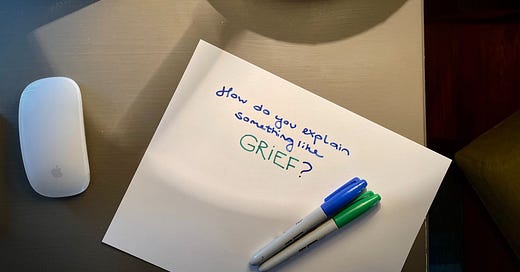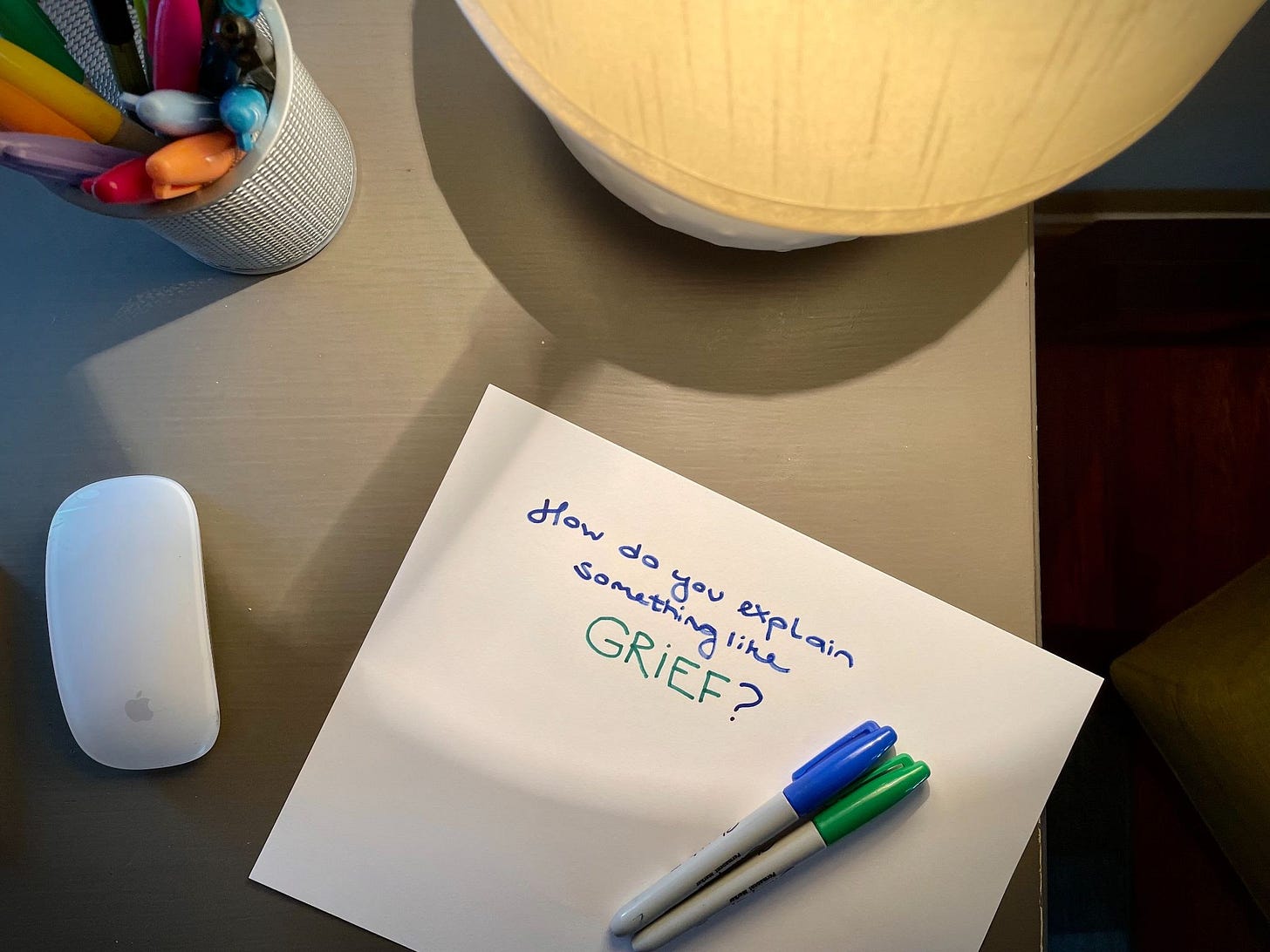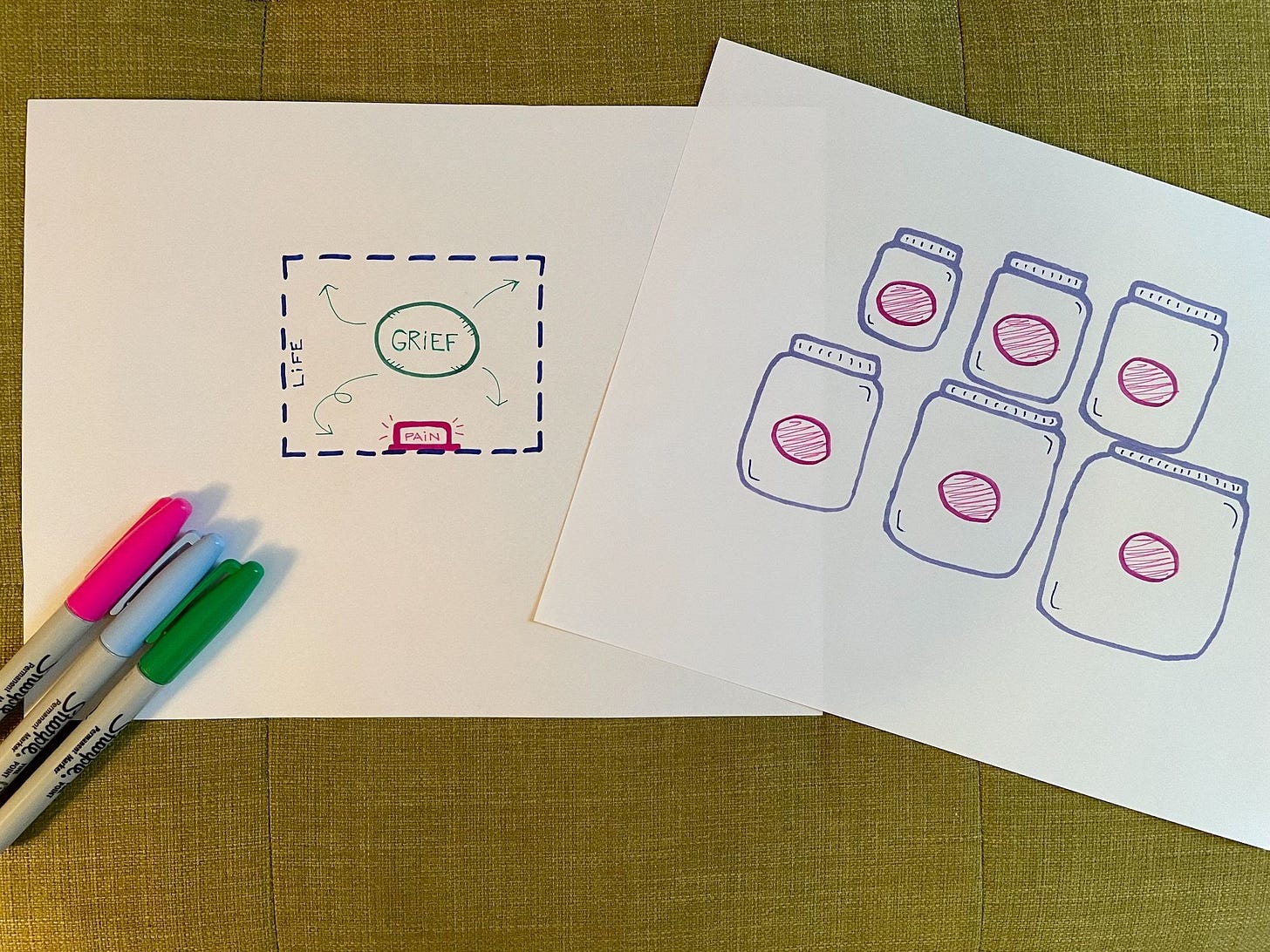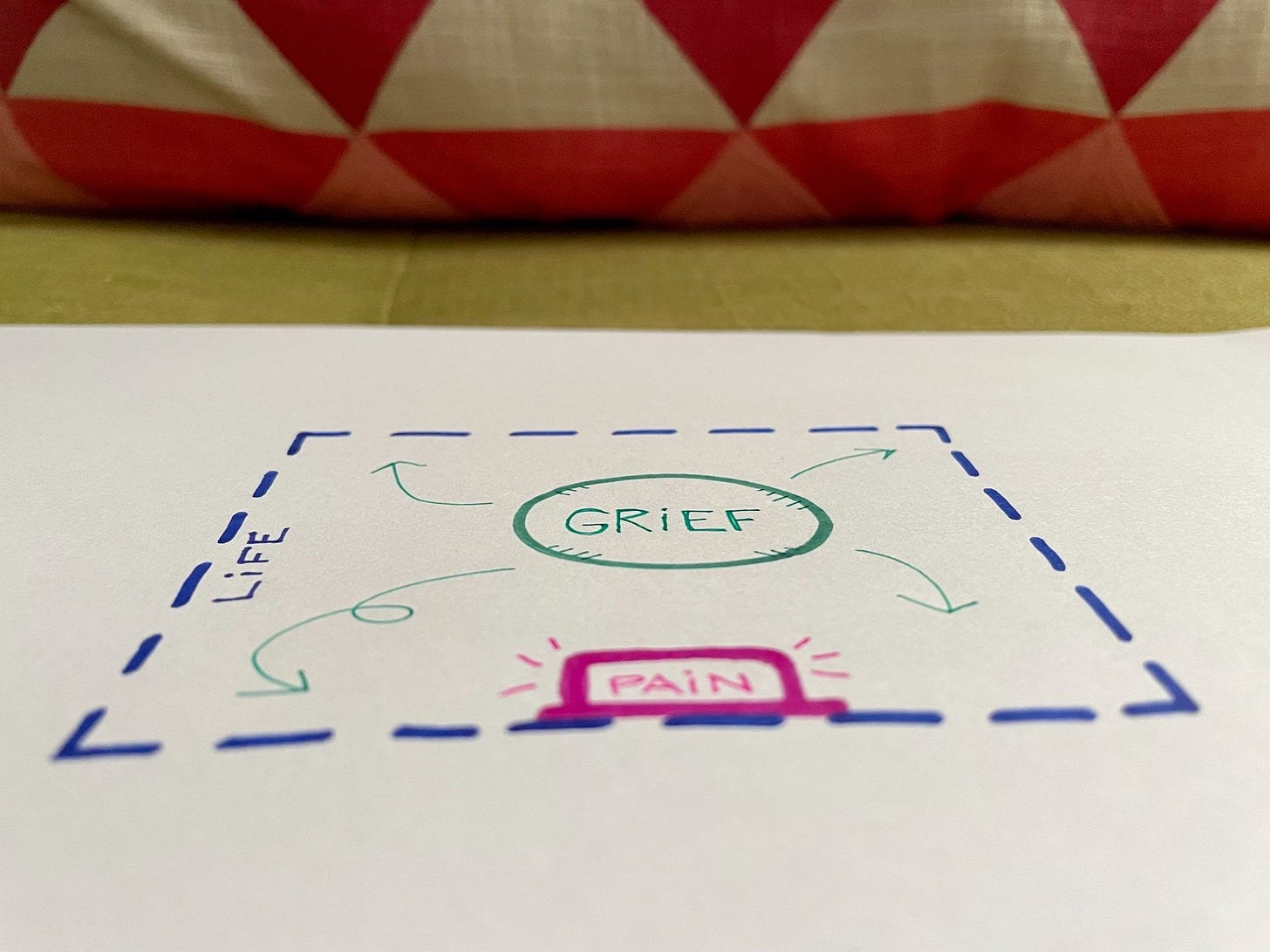There are a lot of metaphors out there to describe grief.
Grief is a roller coaster. It’s a journey. It’s a river you must wade into to get to the other side.
The writer Arthur Golden described grief as “a most peculiar thing,” something we’re helpless in the face of. “It’s like a window that will simply open of its own accord.”
I’ve heard people describe grief as a monster—a beast perpetually lurking in the shadows, that only you can see. Perhaps that’s why C.S. Lewis said, “No one ever told me that grief felt so like fear.”
In Eat, Pray, Love, Elizabeth Gilbert described deep grief as “a specific location, a coordinate on a map of time.”
“When you are standing in that forest of sorrow, you cannot imagine that you could ever find your way to a better place,” Gilbert wrote. “But if someone can assure you that they themselves have stood in that same place, and now have moved on, sometimes this will bring hope.”
One of the most ubiquitous grief concepts describes emotions as waves, which I wrote about earlier this year.
The more I thought about it, the more it made sense that Florida—a state surrounded by the ocean—would be an ideal place to grieve. People often describe grief as coming in waves. It’s an apt metaphor. One moment you’ll be floating along, aware of the sadness around you, but navigating it all just fine. Next, you’ll be slammed by the rush of feelings—gasping for air and desperately trying to gain your equilibrium before the next wave hits.
Two of my favorite metaphors for grief involve balls. (Yes, the middle-schooler in me is laughing, too.)
First, there’s the idea of the ball in the box. Imagine your life as a box, and the grief you’re feeling as the ball. Also inside the box is a button that emits pain whenever it gets pushed. Fun!
When you’re at your deepest grief, the ball is huge. It pushes against that button all the time. As you move around, once again interacting with the world, that giant ball jumps and jostles, producing non-stop pain. As time goes on, the ball gets smaller and smaller, and it bumps into that pain button less and less often.
The catch, of course, is that when that now-smaller grief ball hits the pain button, it hurts just as much as it did before. A random memory or sneaky anniversary will send your grief ball crashing into your pain button. And it might catch you totally off guard. This is normal. The pain never truly goes away—grief will always be part of your life—but it’s thankfully less constant.
You can also imagine grief as a ball in a jar, except this time, the ball never changes size. But you, the jar, will get bigger over time. As you learn to navigate life without the person you lost and dare to open your heart once more, you will grow around your grief.
I think that there are so many metaphors to describe grief because it can be a hard thing to comprehend. It’s not linear, there are no set rules for navigating it, and one person’s grief journey can be totally different from someone else’s experience.
At some point, whether anticipated or not, we will find ourselves in a world where a person (or pet!) whom we love so much is no longer alive. Although we understand on an intellectual level that everyone must die, it makes no sense emotionally. Our hearts and brains clash. We experience things like denial, anger, and depression, and whip through those feelings over and over again.
When we are in deep grief—missing someone we love so intensely—we grasp for comfort, for stability, for something to make sense.
And so, we turn to metaphors. We try to describe grief to each other in a way that makes the impossible easier to understand. That makes room for all of the uncomfortable feelings and wild ups and downs we’re going through.
I’ve been thinking about the many ways to describe grief because, as I mentioned in Friday’s subscriber-only post, two people near and dear to me are currently deep in mourning. They are raw with pain, angry at the world. Right now, their grief is practically sitting on top of their pain buttons. The sorrow they’re feeling is barely contained by their jars. It’s all-encompassing.
Interestingly, I’ve found that grief metaphors are most useful for people who either haven’t experienced intense grief firsthand or haven’t suffered a recent loss. If I texted my cousin or friend the “ball in the box” concept, they’d probably want to respond with something like, No duh, Katie. This stupid grief ball won’t stop hitting this awful pain button! I hate it here, make it stop.
(In reality, they’d probably thank me for sharing the concept, however unnecessary at the time, because they are both patient and wonderful people.)
For me—nearly eight years out from my dad’s death and five years from losing Jamie—these ideas are helpful to revisit. I had forgotten how much grief felt like a monster lurking in the shadows; how hard it is to imagine that you’ll ever find your way out of the forest of sorrow; how grief feels like it's gobbling up all of the room in your crowded jar.
Now that I am holding space for two people in their own deep grief, I vividly remember all of this. My heart breaks for them, knowing the hell they are going through, and it also swells with the knowledge of the immense growth that lies ahead. It will take time and tears and a whole lot of anger, but eventually, both of these amazing women will grow around their grief. It will always be part of them—their sorrow will inform how they view the world. But it will make them more empathetic, more resilient, and a lot less likely to take things for granted.
Perhaps you are going through your own grief journey. You might be riding a wild roller coaster or surfing some intense waves. You could be in a relatively calm place, like I am, but nonetheless surprised to discover that your button emits just as much pain as it did before. Or maybe, you’re standing on the other side of the river, not yet touched by grief, curious about what lies ahead.
No matter where you are, you will eventually be somewhere different. What you are experiencing now won’t last forever. And if you ever find yourself in a spot that feels impossible to describe? I have a feeling there’s a metaphor out there to help you.
xoxo KHG
p.s. What’s your favorite way to describe grief? Maybe it’s a quote or an illustration or an idea that you came up with entirely on your own. I’d love to hear it! Share your grief metaphors, ideas, and drawings (!) by replying to this email, leaving a comment, or sending me a message. I’ll curate your responses in Friday’s newsletter, which is for paying subscribers.
💖 Sharing is caring


This isn’t a Sweet Dumb Brain share, but it’s something I wrote that I’m also proud of! Emily reached out earlier this year to see if I’d be interested in writing a case study about Sahan Journal for the Institute for Nonprofit News. I’d never done something like that before and was nervous, but agreed to the task. I’m so glad I did! If you’re a journalism nerd like me, the final product is worth a read. (And, hey, this is a good time to share that I’m available for hire for a variety of projects.)
If today’s newsletter spoke to you, please consider sharing it on social media, recommending it to a friend, or—if you haven’t yet—becoming a paid subscriber. Thank you!
My Sweet Dumb Brain is written by Katie Hawkins-Gaar. It’s edited by Rebecca Coates, who likened her most desperate moments of grief to searching for pockets of air in a container filling with water.








In experiencing the sudden and unexpected death of my spouse and never facing significant loss in the past, I’ve discovered grief as a horrible game that none of us wanted to play. A game with no rules and definitely no winner.
Grief is a melancholia of sorts. It doesn't seem to want to go away. I describe grief mostly with that word and red colors... jig jags.. scribbles all over the page because it makes zero sense half the time.
I got this newsletter today as I've been struggling with my mother's death today and wondering how bad the holidays are going to be for me this year. I pray not too bad but it's been hard. Off and on it comes and goes, ebbs and flows... like waves. Guess I'll find out.